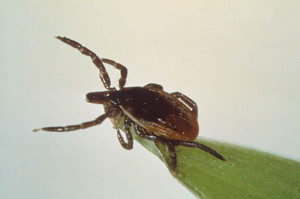PROVIDENCE – The R.I. Department of Health is reminding people to be wary of Lyme-disease-bearing ticks in the wake of reported increases in national and Rhode Island diagnoses of the disease.
Between 2016 and 2017, Rhode Island saw a 22 percent increase in the number of cases of Lyme disease reported by health care providers to RIDOH (927 cases in 2016, compared with 1,132 cases in 2017). Rhode Island has the fourth-highest rate of Lyme disease in the nation. In May, the Centers for Disease Control and Prevention issued a report stating the number of cases of diseases transmitted by ticks, mosquitoes and other insects more than tripled between 2004 and 2016 (27,388 cases in 2004, compared with 96,075 cases in 2016).
“While enjoying our beautiful parks, forests and other outdoor spaces in the coming months, Rhode Islanders should reduce exposure to ticks, check their bodies for ticks and remove ticks whenever they are found to help protect against Lyme disease,” said Director of Health Dr. Nicole Alexander-Scott.
“Climate change – with its elevated temperatures and increased precipitation patterns – could make conditions more hospitable for ticks in the Northeast,” said R.I. Department of Environmental Management Director Janet L. Coit. “That’s why public education is so important – people need to know how to avoid contact with ticks, how to check their body and remove any ticks that are found, and the common symptoms of tick-borne diseases. The attractive, informative materials produced by RIDOH are a wonderful resource, and we’re pleased to make them available for our park and campground visitors.”
Public health officials state the recent increases in Lyme diagnoses could be attributable to many factors. These factors include increased testing because of increased awareness about Lyme disease, more-accurate case reporting by health care providers and an expansion of the areas where people are at higher risk for tick exposure. An additional, possible contributor could be an increase in the number of ticks in Rhode Island, due to a variety of environmental factors, such as increased temperatures and rainfall.
RIDOH provided the following tips on warding off and dealing with ticks:
Repel – Keep ticks off you, your children and pets:
- Avoid wooded and brushy areas with high grass and leaves. If you are going to be in a wooded area, walk in the center of the trail to avoid contact with overgrown grass, brush and leaves at the edges of the trail. You can also spray your clothes with permethrin to keep ticks away. Make sure to not spray this on your skin.
- Wear long pants and long-sleeved shirts when outside.
- Tuck your pants into your socks, so ticks do not crawl under your clothes.
- Wear light-colored clothing, so you can see the ticks more easily.
Check – Check yourself, your children and pets for ticks:
- Take a shower as soon as you come inside, if you have been in grassy or wooded areas.
- Do a full-body tick check using a mirror; parents should check their kids for ticks and pay special attention to the area in and around the ears, in the belly button, behind the knees, between the legs, around the waist and in their hair.
- Check your pets for ticks as well, since they can bring ticks into the home.
Remove – Remove ticks from your body, as well as from children and pets, if you find them:
- Use a set of tweezers to remove the tick. Grasp the tick as close to the skin as possible and pull straight up.
- If you don’t have tweezers, use your fingers with a tissue or rubber gloves.
Rob Borkowski is a PBN staff writer. Email him at Borkowski@PBN.com.













